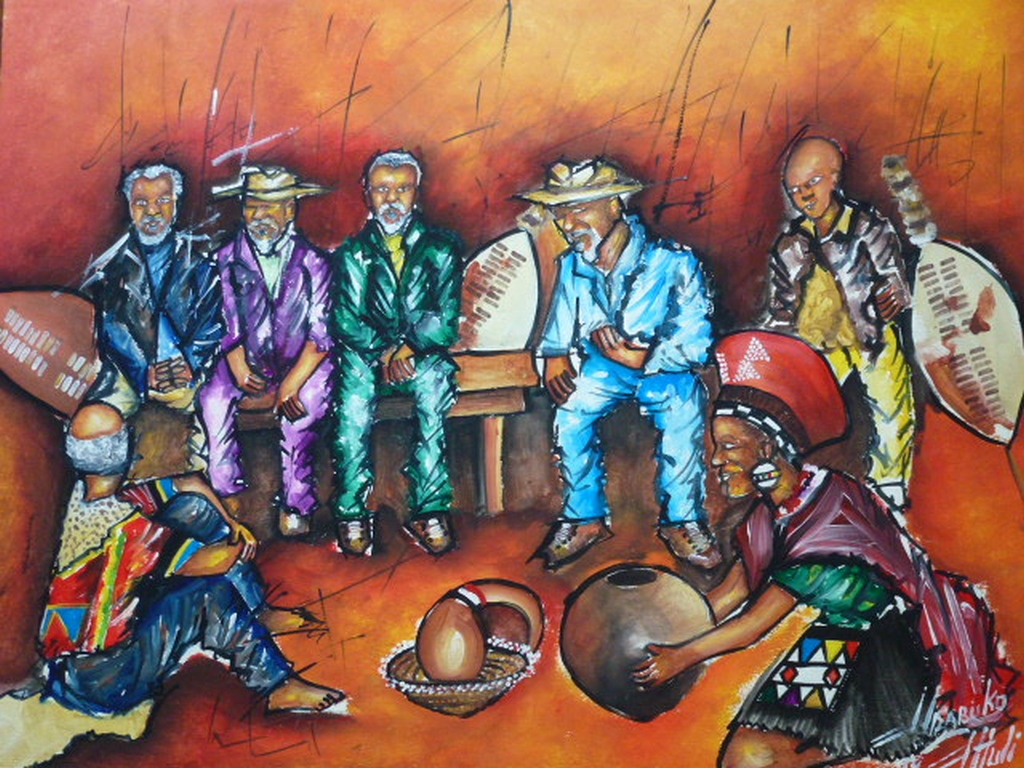Enquiry successful
Your enquiry has been sent successfully. We will be in touch shortly.
About
Ndabuko, Ntuli
“The spirit of the Zulu nation, my ancestors and our Kings and Queens, our history, and age old customs and traditions, the beauty of my homeland, our cattle, my dreams and visions and the captivating sounds of Zulu rhythm and harmonies they tell their stories through my hands and my voice"
Multidisciplinary artist, producer, sangoma, musician and spiritualist Ndabuko Ntuli is an artistic and spiritual polymath. His proud Zulu heritage informs his art, each piece never quite being the same as the last whether it is painted, sculpted, made from discarded materials or drawn. However, despite his media being different from one project to the next, the theme of Zulu storytelling can be absorbed throughout his works.
Born and raised in the Zulu heartland of Kwa-Zulu Natal and moving to Johannesburg at a young age, Ndabuko Ntuli has already enjoyed a storied and diverse career. Not only a professional painter and sculptor, Ntuli was also a professional musician, a sangoma to his community and a spiritualist. One of his main influences was his grandfather, a famed sculptor in his own right, who Ntuli has lovingly created a tribute for in his most recent solo exhibition called ‘Umlayezo Kamkuhulu Wami/My Grandfather’s Message’. In his diverse portfolio of works, one can see a certain theme of traditionalism mixed with the everyday. Haunting, eyeless portraits of elders are created from discarded cans, plastic bottles and adorned with bold, Zulu colouring and geometric patterns. His work is a mosaic of modern South African life: beauty in the darkness, utility in the rejected, simplicity in the convoluted.
Ndabuko Ntuli was groomed for his artistic journey at an early age as he was surrounded by Zulu dance, singing, playing and poetry. Reciting, storytelling and art was part of daily life in his village and his family. During the apartheid era life in the village made it difficult for artists to earn a living from the work they produced. Many dreams died and talent was unrealized because of this hardship. The only expectation held within the village was to leave home for the big cities to seek employment and work to support their families in the villages. Many artists had to flee South African security forces and live and work in exile, and Ntuli’s grandfather was on the list of artists whose work suffered dearly under the oppressive regime.
Art and inspiration were gifts stolen from Ntuli’s late grandfather, Masobeshe Ntuli. He produced gigantic sculptures, a gift he inherited from his father who was brutally killed by white South Africans for his work because it was seen as a threat and to discourage the next generation of African artists. However Masobeshe was a stubborn man and continued to produce great work, most of which left the country with foreign buyers. Masobeshe eventually went into exile where he continued to produce his craft. Upon his return to South Africa, he was captured and died under suspicious conditions.
